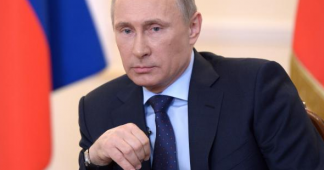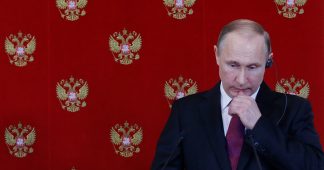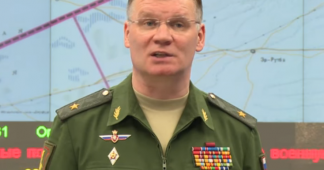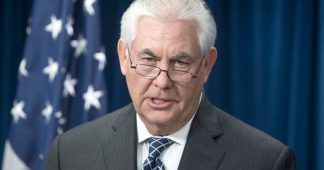Lambasting the United States’ aggression against Syria, Bolivian Ambassador to the United Nations Sacha Llorenti compared the basis for the unilateral move to former U.S. Secretary of State Colin Powell’s infamous 2003 presentation to the body, when fraudulent evidence of an alleged Iraqi weapons program was presented to justify the U.S. war on Iraq.
Holding up an enlarged photo of Colin Powell’s “weapons of mass destruction” speech, Llorenti made an impassioned plea to hold the U.S. to account for Thursday’s unprovoked attack on Syria, noting the U.S. history of imperialist interventions in other nations, including Latin America.
“Now the United States believe that they are investigators, they are attorneys, judges and they are the executioners. That’s not what international law is about.”
The Andean nation currently holds a non-permanent seat on the U.N. Security Council.
“I believe it’s vital for us to remember what history teaches us and on this occasion (in 2003), the United States did affirm, they affirmed that they had all the proof necessary to show that Iraq had weapons of mass destruction but they were never found … never were they found,” the Bolivian envoy told the emergency Security Council meeting on Friday.
On Feb. 5, 2003, Secretary Powell presented fabricated “proof” that Saddam Hussein’s government in Iraq was developing weapons of mass destruction, including deadly nerve agents. The presentation has since been widely discredited, as no evidence of a weapons program was ever discovered. Powell himself expressing regret over what he termed “a great intelligence failure” — a failure that originated in his own exaggerated and doctored interpretation of intercepted Iraqi communications.
The U.S. launched dozens of tomahawk cruise missiles at the Shayrat air base in Homs Thursday night. The Russian Defense Ministry claims that only 23 of 59 missiles reached the intended target, with the remainder landing in nearby villages. Syrian media sources are reporting that nine civilians died in the attack, four children.
The attack was a response to an alleged Sarin gas attack on the rebel-held town of Khan Sheikhoun. The incident claimed 89 lives, including 33 children and 18 women, according to local opposition authorities.
Syrian government representatives have denied that it would use such weapons, stating that the alleged proof of a Syrian military role is, in fact, propaganda fabricated by opposition groups like Jabhat al-Nusra. Russian President Vladimir Putin’s spokesman, Dmitry Peskov, said that Putin considers the strikes to be “aggression against a sovereign state in violation of international law, and under a false pretext.”
Arguing that the U.S. acted unilaterally and in flagrant violation of the U.N. charter, the Bolivian envoy called for a closed-door meeting of the U.N. Security Council.
“The United States was preparing once again and carried out a unilateral attack,” Llorenti said. “The missile attack, of course, is a unilateral action. They represent a serious threat to international peace and security.”
United States Ambassador to the United Nations Nikki Haley denied the request. The U.S. holds the presidency of the Security Council this month.











